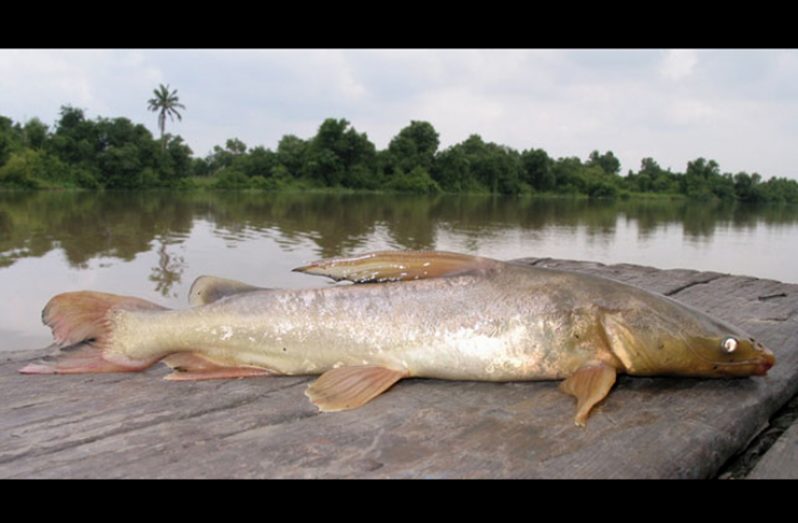THE United States (U.S.) Government on Wednesday through its Georgetown Embassy said the ban on the import of Guyana’s catfish follows notification to the Government of Guyana of impending changes to its food safety regulations regarding fish and shrimp, among many others.
The U.S. Government’s statement on the matter follows earlier comments by Veterinary Public Health Director, Dr. Ozaye Dodson, who said the ban on the country’s catfish species from the U.S. export market though a temporary technical barrier to trade is a “big blow.”
Dr. Dodson in a statement issued by the Ministry of Public Health said the move by the United States Department of Agriculture (USDA) is a “protectionist measure” by that country’s public health system and the catfish farmers who have invested heavily to develop the industry there.
However, the U.S. Government’s statement Wednesday said, “We notified the Government of Guyana of these pending changes in November of 2015, more than 18 months before they were to go into effect. We even gave Guyana an extension until February 3, 2018 to comply with the new regulations.”
The U.S. Embassy said too that most countries in the hemisphere have since complied with the regulations. “We believe that Guyana eventually can and will comply as well.”
“We understand that the Government of Guyana is working on complying, but it has not fully met the standards of the new processes associated with the regulations and until it does, we cannot accept any catfish from Guyana,” the statement said.
The Embassy said the U.S. Government takes very seriously the protection of the world’s waterways and marine life and is constantly updating its regulations and processes to ensure that waterways and marine life are protected.
The Embassy said too that the U.S. Government has offered technical assistance to the Government of Guyana to help local fishermen and women to comply. “Our offer still stands, but it cannot be accomplished overnight.”
The U.S. Government said its goal is to ensure consistency in food safety regulations across products and countries and to protect marine life for future generations; a goal it is confident is shared by all Guyanese.
Meanwhile, the Ministry of Public Health said Guyana’s Veterinary Public Health Department has been mandated under the 2002 Fisheries Act and the Fish and Fishery Product Regulations of 2003 with guidance of the inspections manual to monitor, inspect and certify vessels, landing sites, fish processing establishments and fisheries products for the local and export markets.
Dr Dodson said there are daily inspections and certifications of the catfish products to guarantee their “wholesomeness for human consumption”. He explained that the US Food Safety Inspection Services (FSIS) had asked Guyana to provide the relevant documentation to verify this country’s inspection system equivalence to the US standards or its equivalent degree of public health system to that of the U.S.
Guyana, Dr. Dodson said, complied with the request. However, the country fell short of the U.S. standards in three areas: non-presence of inspectors; insufficient documentation detailing verification of each step in the sanitation and Guyana’s Hazard Analysis and Critical Control Point (HACCP) process; and insufficient documentation specifying how the industry manages adulterated catfish products.
New U.S. standards for import of catfish species demand the presence of inspectors on plants for one hour during an 8-hour shift, but according to Dr. Dodson, Guyana’s inspection pursues a “risk-based approach” which is a European Union (EU) standard.
The Veterinary Public Health official said Guyana’s HACCP and documentation of its inspection frequency will be upgraded to satisfy the new U.S. standards.
“Our (Fisheries) Act is broad, covering all species of fish. The U.S. has specific regulations for the catfish species (and) there has been no change to the local Act since 2003. There will have to be some adjustments to the Fisheries Act Inspection Manual and Regulations to bridge the gaps,” Dr. Dodson said.
He said changes to the country’s Fisheries Act and Regulations will be taken shortly to the Attorney General’s (AG) Chambers and published in the Official Gazette.
When this is accomplished, U.S. officials will conduct an audit of the local Fisheries Department and other relevant agencies “to pave the way for the country’s likely re-entry into the American catfish export market.”
Guyana was among several countries banned recently from the U.S. catfish export market. Others were Bangladesh, Canada, Dominican Republic, El Salvador, Mexico, Myanmar, Nigeria and Pakistan.



.jpg)











